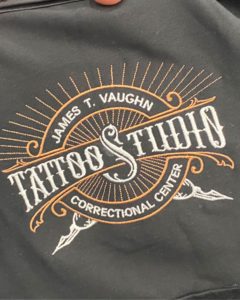
Smyrna, DE – Six inmates from Delaware’s largest state prison are studying to become professional tattoo artists in the newest career pathway training program recently launched by the Delaware Department of Correction at James T. Vaughn Correctional Center. The Tattoo Artist Career Pathway Program aims to set incarcerated individuals up for success when they return to the community, while also reducing the risk of infection and the taxpayer costs of treating communicable disease that can be spread through unsanctioned and unsanitary tattoo practices among the incarcerated population.
“We recognize that tattooing is a part of prison culture, and we are concerned about the health risks that come from unsanitary tattooing inside the walls,” said Department of Correction Commissioner Terra Taylor. “The Tattoo Artist Career Pathway Program demonstrates our creative thinking to bring prison tattooing out of the shadows, create educational opportunities to build a practical career, and prevent the spread of bloodborne diseases like Hepatitis. This pilot vocational training program meets the built-in demand for prison tattoos in a safe, hygienic, and supervised environment, creates new opportunities for incarcerated individuals to perform meaningful work, and supports our safety mission by creating incentives to keep inmate tattoo artists and customers out of trouble.”
DOC’s tattoo program gives incarcerated individuals with an interest in tattooing the opportunity to develop a marketable skill, achieve industry recognition, and get practical hands-on experience. Tattoo artist student candidates must demonstrate artistic ability and are carefully selected among individuals who have taken responsibility for their crimes, demonstrated consistently good behavior, and exhibited a strong commitment to their own rehabilitation. Tattoo program students begin their training with 24 weeks of comprehensive classroom instruction and practice that emphasizes health and safety, proper use of tools, artistic design, and tattooing technique. The first six students have completed their classroom training and have begun to ink tattoos for inmate customers in JTVCC’s tattoo studio which is located in converted storage space on the prison campus. Inmate customers pay for their tattoos using personal funds.
The Tattoo Artist Career Pathway Program operates under the direction of the prison Warden and the JTVCC Prison Arts team, with on-site staffing by Correctional Officers. It is led by licensed tattoo artist Larry Normile, owner of Artistic Additions tattoo studio in Dover. Normile brings 27 years of tattooing experience along with decades of professional mentorship and personal support for reentry initiatives that serve individuals in the criminal justice system. Throughout 2024, Normile collaborated with Department of Correction leadership and JTVCC staff to develop a comprehensive tattoo training curriculum that exceeds the less formal experiential instruction that aspiring tattoo artists typically receive in the community. Normile leads daily classroom instruction with inmate students and collaborates with security staff to provide hands-on supervision for the tattoo artist apprentices in the prison tattoo studio. The tattoo artist career pathway program lasts 12-18 months, depending on the participant’s pace of learning and skill proficiency, under the continual close supervision of tattoo program instructors and JTVCC security staff.
“I have almost thirty years of experience in the tattoo industry, and as a tattoo artist and small business owner I have learned the training and resources that are needed to make it a successful career,” said Tattoo Artist Career Pathway Program Instructor Larry Normile. “I take my work seriously and am passionate about teaching, and I am excited about this opportunity to put my experience to work helping incarcerated men develop their skills, learn the value of work, and use their talents to achieve career and life success. I have been impressed by the artistic ability, positive attitude, and strong work ethic exhibited by our first group of tattoo artist students. I believe this program is already making a difference and is opening the door to second chances.”
Since the first class of inmate tattoo artist apprentices began serving the inmate population last month, 25 tattoos have been completed and 200 inmate customers are on the studio’s waiting list. Inmates from other state prisons have even expressed an interest in transferring to JTVCC to gain access to the tattoo program. Inmate tattoos must first be approved through clear procedures. Eligibility is open to inmates who have earned minimum and medium security classification who have had no significant disciplinary infractions within the past year. Eligible customers participate in an in-person consult with their inmate tattoo artist to collaborate on a tattoo design and to determine a sales price. Tattoo designs are reviewed by security staff to ensure they comply with standards relating to violence, symbols, and gang affiliation. Tattoo costs are paid by customers and payments received are split between the tattoo artist and the JTVCC tattoo studio to cover DOC’s program and equipment expenses.
After completing their apprenticeship training inmate tattoo artist students will continue working in the JTVCC tattoo studio serving inmate customers and building up their professional portfolio. For aspiring tattoo artists breaking into the industry, obtaining employment in an established studio, and earning a living can be difficult and it takes years to develop a professional portfolio and build a client network to sustain a career. DOC’s Tattoo Artist Career Pathway Program is designed to put inmate graduates on a direct path to success. Each graduate will be released from incarceration with a portfolio that showcases their completed tattoos and artistic skill, and Normile will connect them with employment in established tattoo studios to hit the ground running and work toward earing their own Tattoo Artist licenses. Most students from the first training class are set for release from prison within the next 36 months.
After DOC’s initial class of six inmate tattoo artist students complete their apprenticeships a new group of students will be selected to begin the training program. The program is designed to be expanded at JTVCC as needed to meet continued student interest and customer demand. A longer-term goal is to expand the training program to include tattoo removal.
MITIGATING HEPATITIS RISK AND TREATMENT COSTS: Studies have demonstrated a significant risk of Hepatitis infection when tattoos are applied in unsanitary and unsanctioned prison settings and have found no definitive evidence for an increased risk of infection when tattoos are received in professional studios. Hepatitis can be treated through medication, but treatment is costly. Hepatitis medication expenses paid by the Delaware DOC range from $14,000 to more than $57,000 per inmate patient and a 2022 federal Health and Human Services Inspector General report found that nationwide, Hepatitis medication treatment costs range from $22,000 to $95,000 per patient. While the biggest Hepatitis risk in Delaware’s correctional facilities comes from individuals who are infected in the community prior to arrest, the DOC is committed to measures that reduce risk of transmission within correctional facilities, including unsanctioned tattooing, to protect inmate health and save treatment costs paid by taxpayers. As of December 2024, 43 individuals currently incarcerated in DOC facilities have been identified with Hepatitis infection.



###

Keep up to date by receiving a daily digest email, around noon, of current news release posts from state agencies on news.delaware.gov.
Here you can subscribe to future news updates.

Smyrna, DE – Six inmates from Delaware’s largest state prison are studying to become professional tattoo artists in the newest career pathway training program recently launched by the Delaware Department of Correction at James T. Vaughn Correctional Center. The Tattoo Artist Career Pathway Program aims to set incarcerated individuals up for success when they return to the community, while also reducing the risk of infection and the taxpayer costs of treating communicable disease that can be spread through unsanctioned and unsanitary tattoo practices among the incarcerated population.
“We recognize that tattooing is a part of prison culture, and we are concerned about the health risks that come from unsanitary tattooing inside the walls,” said Department of Correction Commissioner Terra Taylor. “The Tattoo Artist Career Pathway Program demonstrates our creative thinking to bring prison tattooing out of the shadows, create educational opportunities to build a practical career, and prevent the spread of bloodborne diseases like Hepatitis. This pilot vocational training program meets the built-in demand for prison tattoos in a safe, hygienic, and supervised environment, creates new opportunities for incarcerated individuals to perform meaningful work, and supports our safety mission by creating incentives to keep inmate tattoo artists and customers out of trouble.”
DOC’s tattoo program gives incarcerated individuals with an interest in tattooing the opportunity to develop a marketable skill, achieve industry recognition, and get practical hands-on experience. Tattoo artist student candidates must demonstrate artistic ability and are carefully selected among individuals who have taken responsibility for their crimes, demonstrated consistently good behavior, and exhibited a strong commitment to their own rehabilitation. Tattoo program students begin their training with 24 weeks of comprehensive classroom instruction and practice that emphasizes health and safety, proper use of tools, artistic design, and tattooing technique. The first six students have completed their classroom training and have begun to ink tattoos for inmate customers in JTVCC’s tattoo studio which is located in converted storage space on the prison campus. Inmate customers pay for their tattoos using personal funds.
The Tattoo Artist Career Pathway Program operates under the direction of the prison Warden and the JTVCC Prison Arts team, with on-site staffing by Correctional Officers. It is led by licensed tattoo artist Larry Normile, owner of Artistic Additions tattoo studio in Dover. Normile brings 27 years of tattooing experience along with decades of professional mentorship and personal support for reentry initiatives that serve individuals in the criminal justice system. Throughout 2024, Normile collaborated with Department of Correction leadership and JTVCC staff to develop a comprehensive tattoo training curriculum that exceeds the less formal experiential instruction that aspiring tattoo artists typically receive in the community. Normile leads daily classroom instruction with inmate students and collaborates with security staff to provide hands-on supervision for the tattoo artist apprentices in the prison tattoo studio. The tattoo artist career pathway program lasts 12-18 months, depending on the participant’s pace of learning and skill proficiency, under the continual close supervision of tattoo program instructors and JTVCC security staff.
“I have almost thirty years of experience in the tattoo industry, and as a tattoo artist and small business owner I have learned the training and resources that are needed to make it a successful career,” said Tattoo Artist Career Pathway Program Instructor Larry Normile. “I take my work seriously and am passionate about teaching, and I am excited about this opportunity to put my experience to work helping incarcerated men develop their skills, learn the value of work, and use their talents to achieve career and life success. I have been impressed by the artistic ability, positive attitude, and strong work ethic exhibited by our first group of tattoo artist students. I believe this program is already making a difference and is opening the door to second chances.”
Since the first class of inmate tattoo artist apprentices began serving the inmate population last month, 25 tattoos have been completed and 200 inmate customers are on the studio’s waiting list. Inmates from other state prisons have even expressed an interest in transferring to JTVCC to gain access to the tattoo program. Inmate tattoos must first be approved through clear procedures. Eligibility is open to inmates who have earned minimum and medium security classification who have had no significant disciplinary infractions within the past year. Eligible customers participate in an in-person consult with their inmate tattoo artist to collaborate on a tattoo design and to determine a sales price. Tattoo designs are reviewed by security staff to ensure they comply with standards relating to violence, symbols, and gang affiliation. Tattoo costs are paid by customers and payments received are split between the tattoo artist and the JTVCC tattoo studio to cover DOC’s program and equipment expenses.
After completing their apprenticeship training inmate tattoo artist students will continue working in the JTVCC tattoo studio serving inmate customers and building up their professional portfolio. For aspiring tattoo artists breaking into the industry, obtaining employment in an established studio, and earning a living can be difficult and it takes years to develop a professional portfolio and build a client network to sustain a career. DOC’s Tattoo Artist Career Pathway Program is designed to put inmate graduates on a direct path to success. Each graduate will be released from incarceration with a portfolio that showcases their completed tattoos and artistic skill, and Normile will connect them with employment in established tattoo studios to hit the ground running and work toward earing their own Tattoo Artist licenses. Most students from the first training class are set for release from prison within the next 36 months.
After DOC’s initial class of six inmate tattoo artist students complete their apprenticeships a new group of students will be selected to begin the training program. The program is designed to be expanded at JTVCC as needed to meet continued student interest and customer demand. A longer-term goal is to expand the training program to include tattoo removal.
MITIGATING HEPATITIS RISK AND TREATMENT COSTS: Studies have demonstrated a significant risk of Hepatitis infection when tattoos are applied in unsanitary and unsanctioned prison settings and have found no definitive evidence for an increased risk of infection when tattoos are received in professional studios. Hepatitis can be treated through medication, but treatment is costly. Hepatitis medication expenses paid by the Delaware DOC range from $14,000 to more than $57,000 per inmate patient and a 2022 federal Health and Human Services Inspector General report found that nationwide, Hepatitis medication treatment costs range from $22,000 to $95,000 per patient. While the biggest Hepatitis risk in Delaware’s correctional facilities comes from individuals who are infected in the community prior to arrest, the DOC is committed to measures that reduce risk of transmission within correctional facilities, including unsanctioned tattooing, to protect inmate health and save treatment costs paid by taxpayers. As of December 2024, 43 individuals currently incarcerated in DOC facilities have been identified with Hepatitis infection.



###

Keep up to date by receiving a daily digest email, around noon, of current news release posts from state agencies on news.delaware.gov.
Here you can subscribe to future news updates.
This post was originally published on this site be sure to check out more of their content.






































































